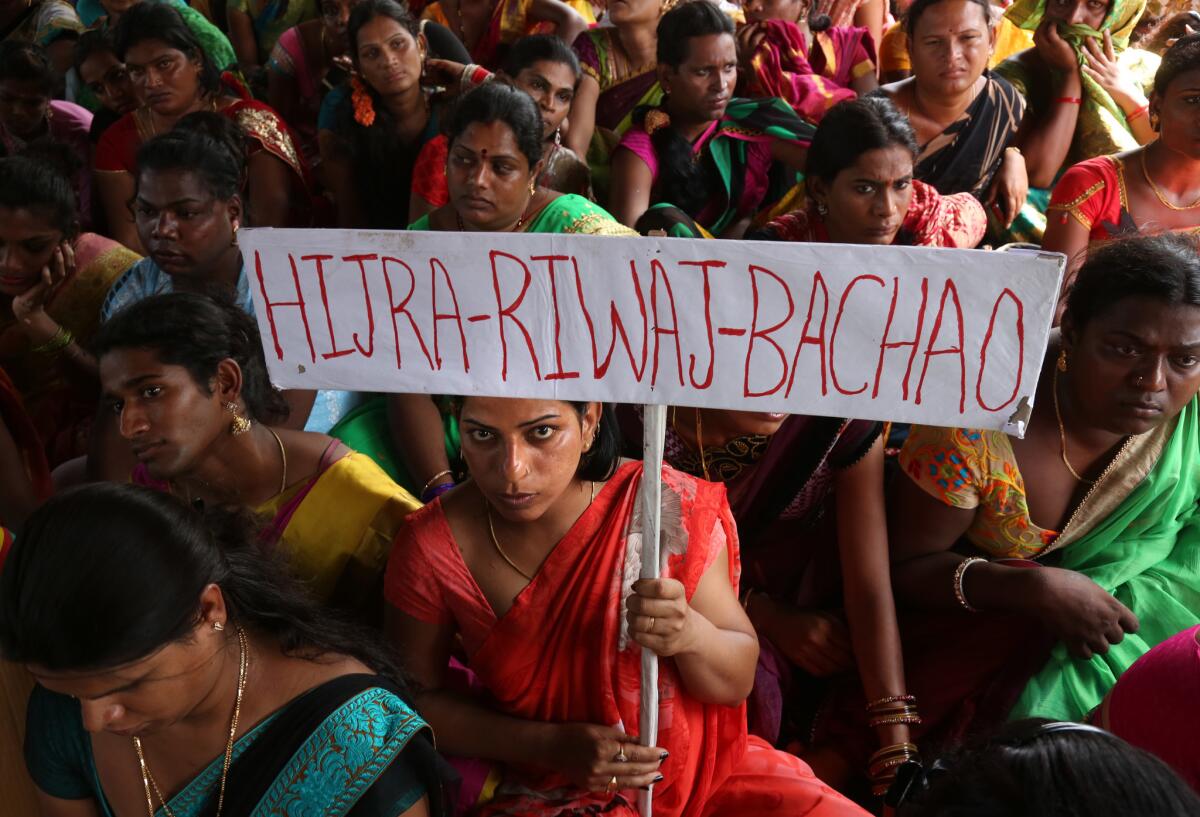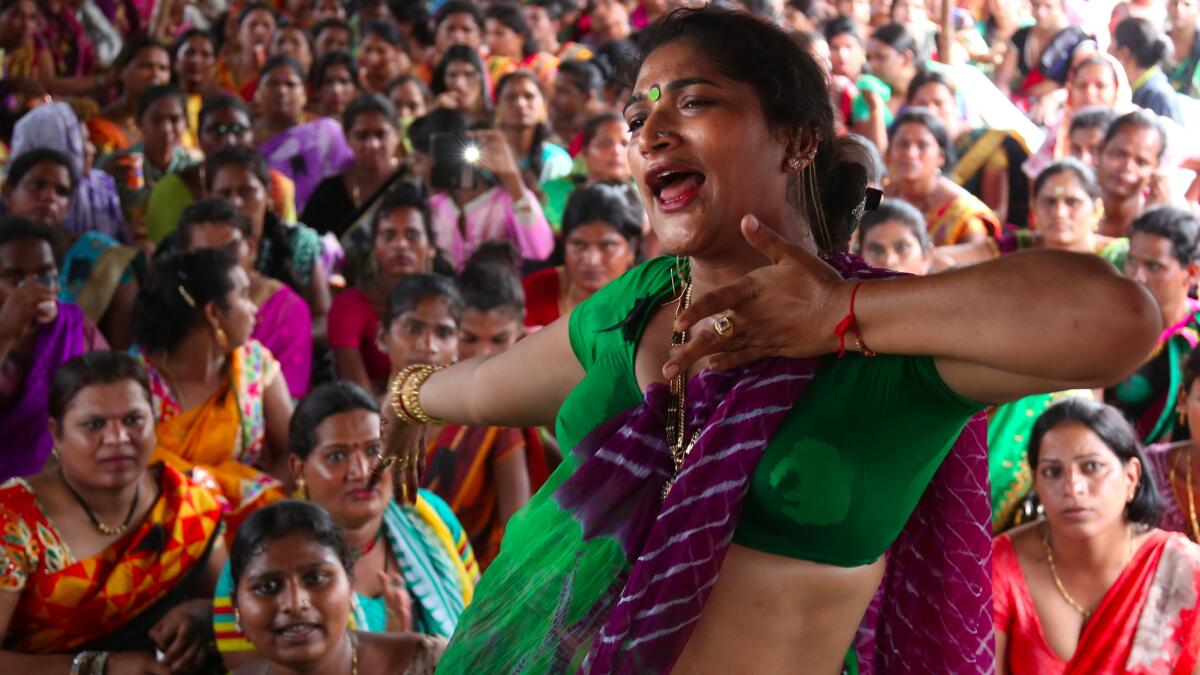Why transgender Indians oppose a bill that aims to protect them

Reporting from Mumbai, India — After her grandmother passed away five years ago, Urmi Jadhav’s family abandoned her. They do not care whether she is dead or alive, Jadhav said.
“My grandmother used to stand by me,” said Jadhav, a 45-year-old transgender woman. “After she passed away, my mother, sister and brother made my life miserable.” That included shutting her out of her grandmother’s inheritance, she said.
The estimated 500,000 transgender people in India face intense discrimination, prompting lawmakers last month to introduce the country’s first legislation aimed at guaranteeing their rights. But transgender activists say it could actually make their lives more difficult.
The bill affirms the rights of transgender people to gain an education, hold a job, receive healthcare and rent and buy property. Anyone who violates the provisions would be subject to fines and jail sentences of six months to two years.
As if the humiliation we face in the society was not enough, the government has decided to inflict an added misery.
— Urmi Jadhav, a representative of Humsafar Trust
The bill also reserves certain numbers of government jobs for transgender people, as India does for members of disadvantaged castes and tribes.
But to exercise these rights, the law would require people to obtain a certificate from a screening committee that certified them as transgender. The committee would be made up of health and welfare officials, a psychologist and a member of the transgender community, but the bill does not specify how transgender status would be checked.
Jadhav, a representative of Humsafar Trust, said she can’t bear the thought of strangers determining her identity.
“Who are they to decide whether I am transgender or not?” Jadhav said. “As if the humiliation we face in the society was not enough, the government has decided to inflict an added misery.”
The bill defines a transgender person as someone who is not wholly male or wholly female, or is a combination of the two. Activists say the language perpetuates the binary categories of male and female that many transgender people find discriminatory, and say it conflates a person’s sexual organs with their gender identity, which may not match.
“Sex is about the biological presences in the body, while gender is something psychological,” said Koninika Roy, advocacy manager at Humsafar Trust. Gender, she said, “is disregarded in the bill’s definition.”
The bill was passed by the Cabinet in July and this month was referred to a committee of experts who could suggest changes. It requires parliamentary approval to become law.

While the legislation was intended to be progressive, activists regard it as a step back from a 2014 judgment in India’s Supreme Court that affirmed a person’s right to identify as a man, woman or transgender person.
Global human rights groups call for adherence to the Yogyakarta Principles, adopted after an international meeting in Indonesia in 2006, which call for legal recognition of a person’s “self-defined sexual orientation and gender identity.”
South Asian countries have been relatively progressive in their adoption of laws based on, or similar to, those principles. Like India, Bangladesh and Nepal have passed legislation recognizing a “third gender.”
In June, clerics in Pakistan issued a decree saying that transgender people should be allowed to marry under Islamic law if they don’t have “visible signs of both genders.” The decree — though not legally binding — came a month after a prominent transgender activist was fatally shot in a killing that underscored the marginalization the community faces.
India still has a colonial-era statute in place that criminalizes sexual relations “against the order of nature,” meaning a transgender person could be arrested for engaging in consensual sex. The transgender rights bill avoids the subject entirely, activists said.
“The bill treats transgenders as asexual,” Humsafar Trust founder Ashok Row Kavi said. “It does not give them the right to love.”
Transgender women — also called hijras — appear in ancient Hindu texts, and their blessings are thought to bring good luck at weddings and births. Despite their role in religion, they are cast off from mainstream society. Many turn to begging — one of their main means of income — or demand large sums to perform at religious ceremonies.
But begging is outlawed, and the bill does not protect transgender people from being arrested for it. Many turn to prostitution.
They endure humiliation at hospitals, where admission forms don’t have a transgender category and doctors are often reluctant to check them physically.
“Doctors verbally ask for symptoms and prescribe medicines,” Jadhav said.
For transgender people who seek sex change operations, the stigma often forces them into shady clinics where procedures are unhygienic, resulting in medical complications and even deaths.
The bill empowers transgender people to complain to police, but one of the gravest sources of abuse they face is the police. Cops use anti-begging laws to harass and sometimes sexually abuse them, and many transgender people would be reluctant to approach the police to report an offense, Jadhav said.
The transgender community in India is organized and tightly knit, largely because many, like Jadhav, are abandoned by their families. The bill seeks to address discrimination by families, saying transgender people have “a right to reside and be included in” their homes, but activists say many families are not sensitized to accept LGBT children.
Row Kavi said the bill did not take into account the needs and preferences of the transgender community and would upset the social system the community has developed.
“The government is trying to engage them in its own mythical way,” Row Kavi said.
Parth M.N. is a special correspondent.
ALSO:
While Americans fight over transgender rights, a Canadian province has a simple fix
Why millions of Indian workers just staged one of the biggest labor strikes in history
Meet the Nightcrawlers of Manila: A night on the front lines of the Philippines’ war on drugs
More to Read
Sign up for Essential California
The most important California stories and recommendations in your inbox every morning.
You may occasionally receive promotional content from the Los Angeles Times.










